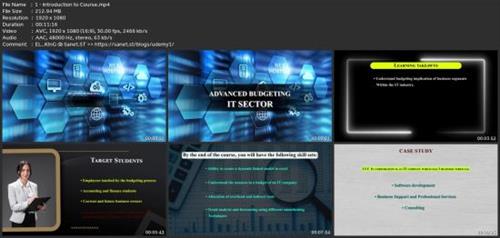Advanced Budgeting And Financial Consulting - It Sector

[center]Published 10/2024
MP4 | Video: h264, 1920x1080 | Audio: AAC, 44.1 KHz
Language: English | Size: 2.31 GB | Duration: 3h 46m[/center]
Unlock the secrets of financial consulting with hands-on techniques and trend analysis to drive business success.
What you'll learn
In this course, students will gain a robust foundation in financial consulting, covering key areas such as revenue analysis, cost management
They will learn how to evaluate financial health through various tools and techniques, such as KPI analysis, moving averages, and overhead allocation.
By the end of the course, students will understand how to assess and interpret quarterly and yearly financial statements
Learn to develop a consolidated budget, and provide actionable recommendations to optimize profit margins.
Through practical examples and hands-on calculations, students will be equipped to confidently navigate complex financial scenarios
Requirements
Basic Understanding of Finance and Accounting: Familiarity with financial terms and principles, such as revenue, costs, profit margins, and budgeting, will be helpful.
Excel Skills: Basic to intermediate knowledge of Excel, including functions and formulas, as Excel will be used for data analysis and budget consolidation.
Description
In today's dynamic business landscape, the ability to make informed financial decisions is paramount. This course, "Advanced Budgeting and Financial Consulting - IT Sector," provides a comprehensive guide to financial consulting, focusing on essential concepts, practical applications, and strategic analysis. Whether you're looking to enhance your consulting skills, support business growth, or optimize financial performance, this course offers the tools and insights you need to thrive in the field of financial consulting.Section 1: IntroductionThe course begins with an engaging introduction that sets the stage for understanding the importance of financial consulting. In Lecture 1, you will receive a comprehensive overview of the course objectives and structure, designed to equip you with the necessary skills. Lecture 2 covers the notes and assumptions that form the foundation of effective financial analysis, ensuring that students grasp the critical concepts that will underpin their consulting practice.Section 2: ConsultingIn this section, we dive into the core components of financial consulting. Lecture 3 introduces the basic assumptions that guide financial forecasting, providing a framework for subsequent analyses. From there, Lectures 4 to 10 explore essential aspects such as revenue generation, cost management, key performance indicators (KPIs), and an analysis of quarterly and yearly financial views (FY02 and FY03). This section emphasizes practical applications and the importance of data in decision-making.Section 3: Business Support and Professional ServicesMoving forward, this section focuses on specific financial metrics relevant to business support and professional services. In Lecture 11, students will analyze revenue for FY01, followed by a detailed examination of costs and quarterly views in Lecture 12. This hands-on approach enables learners to assess financial performance critically and understand the financial health of service-oriented businesses.Section 4: Trend AnalysisUnderstanding trends is vital for forecasting and strategic planning. In this section, students will learn about various trend analysis techniques. Lectures 13 to 15 cover simple averages, moving averages, and weighted moving averages. These methods provide the analytical tools necessary to interpret historical data and predict future performance effectively. Additionally, Lectures on software and shared services enhance the students' understanding of how to utilize these trends in real-world applications.Section 5: Overheads AllocationIn the final section, students will delve into overhead allocation and its impact on financial consulting. Lecture 19 discusses the principles of overhead allocation, while Lectures 20 to 22 focus on the implications of these allocations on profit margins and provide actionable recommendations. This section synthesizes the knowledge gained throughout the course, emphasizing the importance of effective allocation in maximizing profitability and strategic decision-making.Conclusion:As we conclude this course, students will be equipped with a comprehensive understanding of strategic financial consulting. They will gain insights into revenue and cost analysis, trend evaluation, and overhead allocations, empowering them to make informed financial decisions. By applying the techniques learned throughout the course, participants will be prepared to contribute meaningfully to any organization, enhance their consulting skills, and drive business success. Join us in this transformative learning journey and take the first step towards becoming a proficient financial consultant.
Overview
Section 1: Introduction
Lecture 1 Introduction to Course
Lecture 2 Notes and Assumptions
Section 2: Consulting
Lecture 3 Basic Assumptions
Lecture 4 Revenue
Lecture 5 Costs
Lecture 6 KPIs
Lecture 7 Quarterly View
Lecture 8 FY02
Lecture 9 FY03
Lecture 10 Yearly View
Section 3: Biz support and Prof services
Lecture 11 FY01 Revenue
Lecture 12 FY01 Costs and Quarterly View
Section 4: Trend Analysis
Lecture 13 Simple Average
Lecture 14 Moving Average
Lecture 15 Weighted Moving Average
Lecture 16 Software
Lecture 17 Shared Services
Lecture 18 Consolidated Budget
Section 5: Overheads Allocation
Lecture 19 Overheads Allocation
Lecture 20 Allocations
Lecture 21 Profit Margins
Lecture 22 Recommendation
Finance and Accounting Professionals: Individuals working in finance, accounting, or budgeting who want to strengthen their consulting and financial analysis skills.,Business and Financial Analysts: Analysts looking to deepen their understanding of revenue, costs, KPIs, and financial projections within a consulting framework.,Consultants and Advisors: Professionals in consulting roles who need a structured approach to financial metrics, budgeting, and forecasting.,Entrepreneurs and Small Business Owners: Those who want to learn practical financial management techniques to make informed budgeting and resource allocation decisions.,Students and Career Changers: Anyone interested in breaking into finance, consulting, or corporate strategy roles, as the course provides both foundational concepts and practical applications.
Screenshots

Say "Thank You"
rapidgator.net:
https://rapidgator.net/file/94992e8d3acf240367bc70cd9d7aab01/ebjzd.Advanced.Budgeting.And.Financial.Consulting..It.Sector.part1.rar.html https://rapidgator.net/file/696e1c0c510713294d37f29db5c98f8c/ebjzd.Advanced.Budgeting.And.Financial.Consulting..It.Sector.part2.rar.html https://rapidgator.net/file/291f19bf6aa5ae5d989303e6c9c98374/ebjzd.Advanced.Budgeting.And.Financial.Consulting..It.Sector.part3.rar.html
ddownload.com:
https://ddownload.com/nrhnn914hmeo/ebjzd.Advanced.Budgeting.And.Financial.Consulting..It.Sector.part1.rar https://ddownload.com/nybgpi6pdkz4/ebjzd.Advanced.Budgeting.And.Financial.Consulting..It.Sector.part2.rar https://ddownload.com/3o9je3k48z2x/ebjzd.Advanced.Budgeting.And.Financial.Consulting..It.Sector.part3.rar

